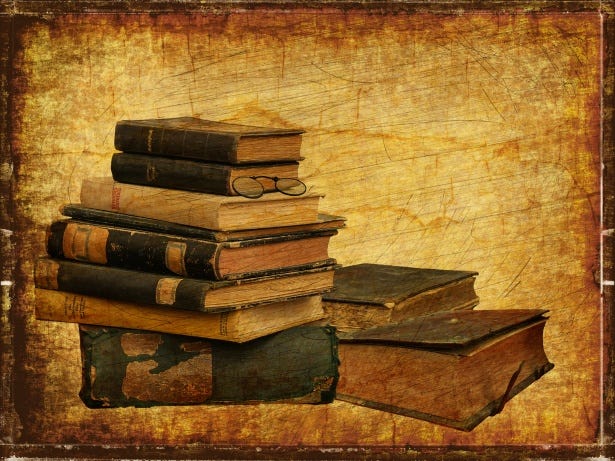Free post: "Why This Text Matters": a recommended video series from the University of Chicago Divinity School
St. Macrina, St. Bernard, Laozi, William James, Franz Kafka... and more
The University of Chicago Divinity School has posted a wonderful series entitled Why This Text Matters, exploring important writings culled from the world’s religious-literary traditions. In these videos, renowned scholars provide stimulating introductions and insights, explaining why the selected texts are worth our attention. I recommend the whole series, but herewith I present you with a few of my favorites.
The series is described on YouTube this way:
Religious studies courses can feature a broad range and variety of texts, including anything from The Daodejing, to The Mishnah, to Dostoevsky’s The Brothers Karamazov, to Mary Douglas’s Purity and Danger, to Said’s Orientalism. The Marty Center partnered with the Undergraduate Religious Studies Program to design “Why This Text Matters” as a series of videos to help faculty prepare for courses, their students, and anyone generally curious about important texts in the study of religion. In the space of about 30 minutes, viewers can gain a deeper understanding of the context, themes, and significance of texts taught by experts at the University of Chicago Divinity School.
*****
Erin Galgay Walsh discusses The Life of St. Macrina by St. Gregory of Nyssa. (Unlike the rest of the videos below, this one has no accompanying description.)
*****
Bernard McGinn presents St. Bernard of Clairvaux’s Sermons on the Song of Songs.
The Song of Songs has been a basic biblical foundation for both Jewish and Christian mysticism over the centuries. Modern readers may find it hard to understand how these highly erotic love poems were read as describing the love between God and his people and God and the individual, but the great Jewish and Christian mystics can help us to grasp this message, as we can see in the Sermons on the Song of Songs of the Cistercian abbot, Bernard of Clairvaux (d. 1153), the most influential of all Christian commentators.
*****
Brook Ziporyn (my favorite translator of Zhuangzi, incidentally) introduces the Daodejing (Tao te Ching).
The Daodejing is an ancient text that became a founding document for both philosophical and religious Daoism, as well as exerting huge influence on all subsequent East Asian Confucian and Buddhist traditions. In the past two hundred years, its massive impact has expanded to worldwide scope. Its complex textual history, its inherent multivalence, and its explosive philosophical content have inspired endless interpretations in East Asia but beyond; indeed, it has been translated into English more times than any other single text. In this lecture, the core structure of the thinking embodied in its many rhetorical modes is laid bare: a thoroughgoing overturning of some of the most basic assumptions about the nature of human desire and action and the world in which they function, raising radical questions about the ultimate value of purposive activity for either human flourishing or for the operation of the cosmos.
*****
Philosophically, I lean toward Jamesian Pragmatism (in case that fact has eluded some of you), so I was dutybound to choose this one: W. Clark Gilpin presents William James’ The Varieties of Religious Experience.
William James published "The Varieties of Religious Experience: A Study of Human Nature" in 1902. By 1928, the book was in its thirty-sixth printing, and it remains one of the most influential books about religion ever written by an American. James, formally trained as a physician, was a member of the Department of Philosophy at Harvard University at a time when psychology was just beginning to separate from philosophy, and interpreters of James’s work have frequently described him as a “philosophical psychologist.” Not surprisingly, then, this book begins its exploration of religion by focusing on personal religious experience: “the feelings, acts, and experiences of individual men in their solitude, so far as they apprehend themselves to stand in relation to whatever they may consider the divine.”
*****
This one may seem an unlikely choice, but I found the discussion here of Franz Kafka’s “Before the Law” by Sarah Hammerschlag… arresting.
Franz Kafka’s "Before the Law" is a text for which there is no shortage of commentary, both when read in the context for which it was originally written in The Trial and as an independent composition, which Kafka published in his lifetime (1915, 1920). It is exactly the text’s capacity to solicit commentary that makes it interesting for Religious Studies. While Kafka has often been described as a modern Jewish writer, the story does not itself indicate or point towards any particular religious tradition. Nonetheless, it can help us think about the interpretive dynamics of scripture, particularly in understanding how religious texts shore up their authority and perpetuate their influence.
*****
There are quite a few more in the playlist (including presentations of biblical books, Augustine, Pascal, Kierkegaard, the Bhagavad Gita, snd more), and you may find some you prefer to my choices. It’s winter still, the nights are long, the days chilly — not the worst time to watch something that perks up the gray cells.



Thank you for this. The playlist is now on my "pile" of things to "read," or in this case, listen to.
Superb links thank you.